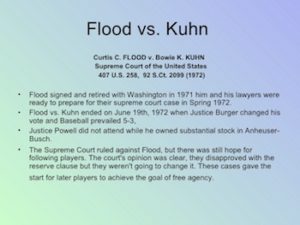
Flood andMiller (1972)
On this date in 1972, Curt Flood lost his suit against Major League Baseball’s (MLB) antitrust statute.
On January 16, 1970, Curt Flood, an African American outfielder with the St. Louis Cardinals, shocked the baseball world and America by suing MLB and its “reserve clause.” Baseball had faced legal challenges in the past, but never had a player of Flood's caliber attempted to attack the game's sacred clause that bound a player and his contract to a team for life. Flood had earned three All-Star appearances, seven Gold Gloves, and a pair of World Series championships. Furthermore, although Flood earned $90,000 a year, he accused baseball of violating the 13th Amendment, barring slavery and involuntary servitude.
With a few exceptions, the public and the media initially reacted to Flood's action with disbelief, singling out the outfielder as an ingrate, a destroyer, and even a blasphemer. Flood's case eventually climbed all the way to the Supreme Court. Flood's lawyer, Arthur Goldberg, gave evidence that baseball's reserve clause violated the antitrust laws by depressing wages and limiting a player to one team. Baseball's argument centered on concepts such as tradition and "The Good of the Game." The arguments of Flood represented a type of reform similar to that embodied in the American Civil Rights Movement.
Flood gained more public sympathy through the course of the case as the nature of the reserve clause became known. The Supreme Court ruled in favor of baseball 5-3, not on the strength of its case, but with the belief that baseball should stay the way it is. The court's decision should have been easy, at least as Flood and his counsel saw it. Goldberg presented no revolutionary argument.
Flood's lawyers did not call for a radical reinterpretation of the Constitution. In Marvin Miller's words, they merely asked that the court "face up to the logic of its own decision in other cases and begin applying that logic to baseball." Since the Toolson case, the court had sided with William Radovich, a football player, in striking down NFL practices counter to antitrust laws.
Yet as the Justice began to read the Court's decision, all in attendance realized the myth of baseball and its seemingly unconstitutional labor practices would remain intact. The Court's decision, more averse to baseball greatness than a legal document, began with a list of 88 baseball legends, from Cap Anson to Babe Ruth. Before dropping phrases such as "the Sherman Anti-Trust Act" or "the 13th Amendment,” the final ruling ended with the court's 5-3 decision against Flood.